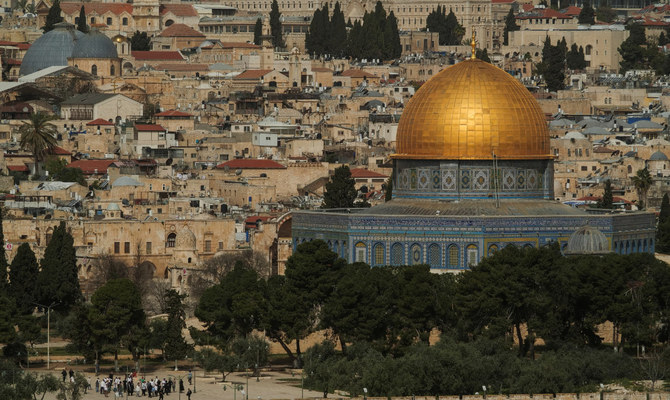RAMALLAH: Israel came under fresh criticism on Sunday for its continued crackdown on Al-Aqsa Mosque and East Jerusalem.
Israel’s measures and US support for them will not lead to security and stability, warned Nabil Abu Rudeineh, the Palestinian Presidency spokesperson.
His remarks came as tension mounted on Sunday at Al-Aqsa and in East Jerusalem following aggressive actions carried out by Israel’s security forces.
Authorities attacked worshipers stationed in Al-Aqsa Mosque for prayers on Saturday night in an attempt to remove them by force.
The move aimed to allow hundreds of Israeli settlers to storm the mosque under the protection of Israeli police the following morning.
The Islamic Awqaf Department said that 912 settlers stormed Al-Aqsa on Sunday.
The Israeli armed forces and intelligence officers deployed in Al-Aqsa were distributed in squares across the site, especially the Al-Qibli prayer square.
Forces escorted settlers who stormed the mosque.
At the same time, Israeli police deployed at Al-Silseleh gate checked the identities of those arriving at Al-Aqsa to worship and prevented young men from entering the site.
The continuous Israeli provocations against the Al-Aqsa Mosque are “unacceptable” and will “turn its courtyards into a battlefield,” leading to a severe deterioration of the situation, warned the Palestinian Presidency spokesperson.
Lamenting the daily attacks against holy sites during Ramadan, Abu Rudeineh added: “The worshipers there have condemned measures and unacceptable actions that work to ignite the region and drag it toward the abyss.”
The presidential spokesman held the Israeli occupation government responsible for the deteriorating situation over its continued torment of worshipers.
At the same time, Israeli authorities extended the closure of West Bank and Gaza Strip crossings until midnight on April 12.
The Israeli facilities for Ramadan remain canceled due to the security escalation.
Palestinians say that the closures are part of a policy to collectively punish the West Bank and Gaza Strip.
Israeli forces also announced the closure of the Ibrahimi Mosque in Hebron’s southern West Bank for two days starting Sunday, under the pretext of Jewish holidays.
Nidal Al-Ja’bari, director general of the Hebron Islamic Awqaf, denounced the closure of the mosque, describing it as a “blatant violation” and a “provocative attack” on the right of Muslims to worship.
The Israeli armed forces also tightened security measures.
Authorities closed all military checkpoints and electronic gates leading to the Ibrahimi Mosque to secure settler celebrations of the Jewish Passover in the mosque and its yards.
Hefzy Abu Sneineh, the imam and preacher of the Ibrahimi Mosque in Hebron — the second most crucial mosque for Muslims after Al-Aqsa in the Palestinian territories — told Arab News that the Ibrahimi Mosque is wholly closed to Muslims, including its outer squares.
Abu Sneina said that 1,000 worshipers perform Tarawih prayers daily in the Ibrahimi Mosque, and about 2,500 perform Asr prayers each day.
Those worshipers will be forced to move to other mosques far away in the city during the two-day lockdown period, he added.
The Israeli army reinforced its deployed forces in the West Bank with three additional brigades and additional Border Police in Jerusalem.
Israeli opposition leader Yair Lapid commented on the tense situation in Jerusalem.
Lapid said that Israeli National Security Minister Itamar Ben-Gvir only wants to ignite the Middle East, warning: “This is what happens when the place (Al-Aqsa Mosque) is entrusted to the most extremist man in Israel.”

























